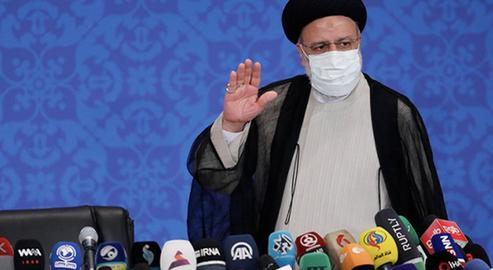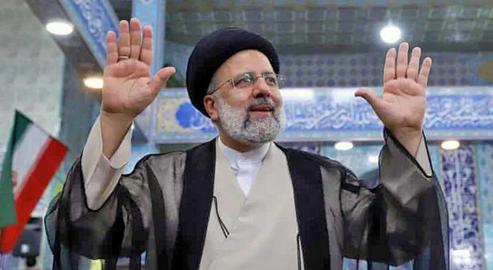In his first press conference after his electoral victory, Iran’s President-elect Ebrahim Raisi had a clear message for the West: “The situation in Iran has changed.”
This message was emphasized through both the tone and the substance of Raisi’s responses to reporters’ questions, especially about his role in the mass executions of political dissidents of 1988, the allegations of crimes against humanity and the future foreign relations of the Islamic Republic.
Raisi’s direct responses to reporters in his first news conference, on June 21, were the closest that one could come to seeing inside the worldview of Ayatollah Ali Khamenei. Raisi lacks the eloquence of the Islamic Republic’s Supreme Leader – but the policies he espouses are the same as those Khamenei favors.
His criticism of European countries, the verbal attacks on the United States, his curt rejection of a possible meeting with President Joe Biden by a simple “No,” his expression of interest in expanding relations with China and in improving relations with countries in the region, with a passing reference to Saudi Arabia, and the announcement that he would not tie Iran’s future to the nuclear agreement; these were the statements that Khamenei probably found most pleasing to his own thinking.
In recent months Iran’s government has focused on trying to end the sanctions imposed by former US president Donald Trump, especially nuclear sanctions, through indirect negotiations with the US before President Hassan Rouhani’s successor takes over in August.
Four years ago, Ayatollah Khamenei had threatened that, if the US left the nuclear agreement, or the Joint Comprehensive Plan of Action (JCPOA) as it is officially known, he would then burn the agreement But for a year after the US did leave the JCPOA, the Islamic Republic carefully complied with it, and only when it was certain that Trump had lost the election did it blatantly increase its levels of uranium enrichment far above what the agreement allows, as a means to pressure Biden’s administration to lift sanctions.
Trivializing the Nuclear Agreement
The Islamic Republic knows the JCPOA is essential for its security, and for its economic recovery, but in the six years since the agreement was signed Khamenei has tried to pretend that it is is of little importance.
Now Ebrahim Raisi is following the same line and, unlike Rouhani, who had associated himself and his presidency with the nuclear agreement, Raisi says he does not tie the destiny of his government to the JCPOA. But he did criticize the US for tossing it aside (under Trump) and, like the Supreme Leader, Raisi said Iran’s regional policies and missile program are non-negotiable even after sanctions are lifted.
In the 32 years since Khamenei took over as the Supreme Leader, the idea of improving relations with US has always been a red line. Raisi also rejected such a prospect in his first appearance as President-elect. He even refused to repeat the cliché that, if the US changed its ways, Iran would welcome better relations.
But this may not be an indication of Raisi’s ultimate intentions regarding relations with the West and the United States. Mahmoud Ahmadinejad was also a fiery opponent of the US and Europe during his early presidency; but in its closing months, he became a supporter of establishing relations with the United States and took a number of steps in this direction, though they went nowhere.
Raisi has held various judiciary positions over the past 40 years and, for Khamenei, he is far more of a known entity than Ahmadinejad. If Raisi decided to pursue better relations with the US and warmer relations with Europe, he would face less opposition from Khamenei than Ahmadinejad or Rouhani. But his previous record will make his presidency different from his predecessors in other ways too: he was a member of the “death panel” that put thousands of jailed political prisoners to death, in 1988, and buried them in unmarked graves. Those prisoners would have otherwise been freed after serving their sentences.
Up to now, no Iranian president had been accused of “crimes against humanity” and none of them had been named on the US sanctions list as a violator of human rights at the time of their election. A person who is suspected or charged with such crimes would have great difficulty in persuading the West to improve relations with his government – and he is liable to prosecution in these countries’ courts.
Lost in Translation
Raisi is well aware of this dark cloud hanging over his head on the international scene. In his first press conference, a reporter asked him about allegations of crimes against humanity in connection with the 1988 mass executions. He responded by calling those who were executed “criminals” and said that his record was “praiseworthy.”
In the press conference, the reporter asked his question in English but, in translation to Persian, the term “crimes against humanity” was removed and the “1988 massacre” was replaced with “executions.” This is bound to happen over and over again if Raisi ever visits Western countries – and he knows it.
Raisi also knows that, even if he pays a heavy price in terms of his standing within the Islamic Republic, he would not be able to personally improve relations with the west. He therefore used his first day as President-elect to not only refuse to send a conciliatory message but to also point the finger at human rights violations within the West – a tactic that was a hallmark of the rhetoric coming out of Iran in the early years after the 1979 Islamic Revolution.
Following unsuccessful attempts by four Iranian presidents, from Akbar Hashemi Rafsanjani to Hasan Rouhani, to normalize relations with the west, Ebrahim Raisi has returned the dominant rhetoric of the Islamic Republic to the 1980s, without taking into account other possibilities and variables, such as the changed expectations and wishes of the Iranian people and the international situation compared to 40 years ago.
Related Coverage:
Ebrahim Raisi's Prospects as Iran's First Sanctioned President-Elect
Why did Hezbollah's Leader Bother to Greet Raisi?
Ebrahim Raisi's Victory Signals Darker Days Ahead for Iran
Election 2021: Raisi Wins; "Invalid" Votes Come Second
Ebrahim Raisi: The Case for the Prosecution
Ebrahim Raisi: Leadership Hopeful's Key Role in Brutalizing Dissidents in the 2000s
Ebrahim Raisi: The 1990s Exploits of "Ayatollah Massacre"
Ebrahim Raisi: The Bloodstained Early Years
Raisi’s Crimes Against Humanity Will Haunt his Presidency

























comments